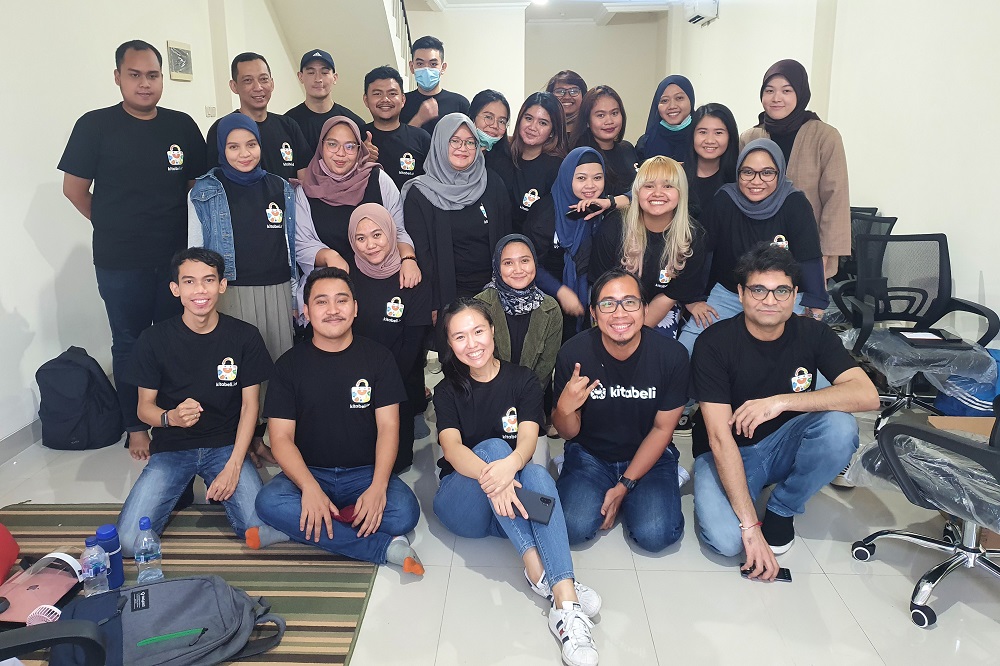The social commerce platform KitaBeli today announced series A funding worth $10 million or equivalent to 144.3 billion Rupiah. This round was led by Gojek’s investment arm, Go-Ventures, and also supported by AC Ventures and East Ventures as the previous investors.
The fresh funds will be used to expand service coverage throughout Java, expand the logistics network, and develop its mobile applications. In addition, product diversification will be enhanced, starting with beauty products. Since launching in March 2020, KitaBeli claims to reach 80% business growth.
From our observation on the app, it is currently limited to a few areas in the provinces of Central Java, West Java, East Java, DKI Jakarta, and Banten. In seconds, it works like an e-commerce application, however, it focuses on serving daily needs; and capable to form purchasing groups (currently through a quick connection to form a WhatsApp group).
KitaBeli offers internal logistics for delivery options with D +1 maximum claim. The model runs through a network of partnerships that have been built in each area of its operation. This concept is considered to be effective since daily needs do require a fast delivery process.
From the official statement, this application will be focused on users in rural areas, including those who have never done online shopping. The Co-Founder & CEO, Prateek Chaturvedi said, the social commerce business model that connects businesses with end-users makes it possible to form and maintain loyalty.
Not to rely on resellers

Social commerce services are mushrooming in Indonesia. The Super App also focuses on a similar concept in the rural areas. However, just like any other platform – including Woobiz, RateS, BorongBareng, or RateS – the partnership model is a reseller. In addition to being the end consumer, people are encouraged to become a bridge between business and customers using a commission system.
It’s quite different with KitaBeli, they don’t build a network of resellers or marketing agents. Each item is ordered directly through the app by end-users (direct-to-consumer), allowing them to participate in group purchases for more effective pricing. Prateek also said that this concept allows companies to minimize the risk of losing their customer base whether an agent/partner decides to quit.
KitaBeli was founded by Prateek Chaturvedi, Ivana Tjandra, Subhash Bishnoi, and Gopal Singh Rathore. Users invite their acquaintances or join to form groups based on regional proximity, then buy products together at a discounted price. Pinduoduo in China is a successful example of this business model.
“With the concept of sharing and inviting your friends to join the application, our users get more discounts. They can also see what their friends are buying, and join the group of friends, to get a cheaper price,” Prateek explained in a previous interview with DailySocial.
Go-Ventures investment
Regarding investment, Go-Ventures’ SVP Investment, Aditya Kumar said that e-commerce penetration in rural areas is quite low. There are some factors, including a lack of trust, product availability, and high logistics costs. KitaBeli’s business model is considered relevant to solve these challenges.
There is no further details on whether there will be an integration of KitaBeli with Gojek, considering that one of the VC’s missions is to form a consolidation of strengthening the ecosystem.
For local startups, Go-Ventures has invested in several other players. Also to lead the investment for eFishery’s series B funding, Pluang’s series A, as well as investing in the Kumparan and Narasi media.
Pluang alone is now integrated into the GoInvestasi feature, making it easy for Gojek users to invest gold online. In addition, Kumparan also provides news through the Gojek application.
Meanwhile, for startups outside Indonesia, some of the announced investments include funding to an Uganda-based ride-hailing platform called SafeBoda, the Mobile Premier League (MPL) esports platform from India, and cloud kitchen startup Rebel Foods from India.
Rebel Foods has arrived in Indonesia to form a new cloud kitchen business line under the Gojek Group. Meanwhile, MPL’s presence in Indonesia is also supported by Gopay payments as its initial payment platform.
–
Original article is in Indonesian, translated by Kristin Siagian













